|
|
|
Sort Order |
|
|
|
Items / Page
|
|
|
|
|
|
|
| Srl | Item |
| 1 |
ID:
090011
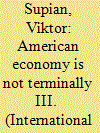

|
|
|
|
|
| Publication |
2008.
|
| Summary/Abstract |
In the early 21st century, political and economic configuration of the contemporary world has become much more complicated which explains why the claims of political and economic hegemony in the world as well as the unipolar world of the early post-Soviet period are causing much more doubts than before. Economic dynamics of large developing countries such as China, India and Brazil; Russia's gradual economic revival coupled with its much greater role in the world power supply; much wider economic potential of the European Union achieved thanks to the new members; the serious financial and socioeconomic problems in the United States that surfaced in the latter half of the current decade - all this is adding fuel to the discussion about America's ability to remain the economic, and hence, military-political leader of the contemporary world.
|
|
|
|
|
|
|
|
|
|
|
|
|
|
|
|
| 2 |
ID:
090024
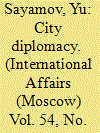

|
|
|
|
|
| Publication |
2008.
|
| Summary/Abstract |
Without a doubt, city diplomacy will have to be studied thoroughly as the most interesting phenomenon and an integral component of modern international affairs. Today it consists of an entire system of interaction between of state and municipal governments of cities, intergovernmental, intercity and nongovernmental international organizations, national, regional, municipal and local commercial and noncommercial agencies, institutes of civil society in various cities and countries around the world. The principal goal of international cooperation of cities within this system is perhaps comprehensive development of urban habitat, infrastructure, social sphere, culture, education, sport and leisure facilities to improve conditions for urban residents, foster peace, tolerance, religious and ethnic harmony, prevent and resolve threats and conflicts and threats to security, and to improve understanding between countries and nations.
|
|
|
|
|
|
|
|
|
|
|
|
|
|
|
|
| 3 |
ID:
090017


|
|
|
|
|
| Publication |
2008.
|
| Summary/Abstract |
Russia's Dyanamic development is increasing its appeal. There is a resurging interest everywhere in its history and traditions, culture and the Russian language. In order to sustain this interest it is extremely important for us to analyze the experience gained by our good foreign partners; not least that of the Federal Republic of Germany. Germany's experience in promoting its language and culture in other countries is of interest to us from many viewpoints. We and the Germans have for centuries been in close cooperation and rivalry and experienced many similar ups and downs throughout history and we have deep European cultural roots.
RUSSIA'S DYNAMIC DEVELOPMENT is increasing its appeal. There is a resurging interest everywhere in its history and traditions, culture and the Russian language. In order to sustain this interest it is extremely important for us to analyze the experience gained by our good foreign partners; not least that of the Federal Republic of Germany. Germany's experience in promoting its language and culture in other countries is of interest to us from many viewpoints. We and the Germans have for centuries been in close cooperation and rivalry and experienced many similar ups and downs throughout history and we have deep European cultural roots.
|
|
|
|
|
|
|
|
|
|
|
|
|
|
|
|
| 4 |
ID:
090026


|
|
|
|
|
| Publication |
2008.
|
| Summary/Abstract |
Russia and Romania established diplomatic relations on 15 October 1878, the day that served the watershed in the history of the two countries' bilateral relations and that resounded across the Balkans. Russia that had done a lot to help Romania gain independence extended its political support to the new state thus strengthening, to a great extent, its foreign policy positions. Russia's recognition of Romania's independence crowned its long and persistent straggle for complete independence and sovereignty waged to liberate the country from foreign enslavement and unwelcome foreign patrons.
|
|
|
|
|
|
|
|
|
|
|
|
|
|
|
|
| 5 |
ID:
090013


|
|
|
|
|
| Publication |
2008.
|
| Summary/Abstract |
The world that we live in today is, in its pure, refined form, a product of total domination by one superpower - the United States of America, which has relied in its policy on support from a number of key Western European states, as well as Japan. However, it should be noted in fairness that the US partners have always been playing a secondary role, only assisting Washington, providing a kind of retinue for the sovereign, as it were.
|
|
|
|
|
|
|
|
|
|
|
|
|
|
|
|
| 6 |
ID:
090021


|
|
|
|
|
| Publication |
2008.
|
| Summary/Abstract |
The Russian Federation's foreign policy gives top priority to relations with the Commonwealth of Independent States, hence the important place of Russia's Federal Customs Service in cooperation with the customs services in the former Soviet Union.
|
|
|
|
|
|
|
|
|
|
|
|
|
|
|
|
| 7 |
ID:
090014


|
|
|
|
|
| Publication |
2008.
|
| Summary/Abstract |
The armed conflict in South Ossetia destroyed not only most of the homes, schools, universities, administrative buildings, including the OSCE office, but also Tskhinval's historical landmarks, including the Jewish quarter, a war memorial, medieval churches and a synagogue - all in all, more than ten unique landmarks of the cultural heritage. This constitutes a violation of such fundamental international laws as the 1954 Hague Convention for the Protection of Cultural Property in the Event of Armed Conflict, and the 1972 Convention
|
|
|
|
|
|
|
|
|
|
|
|
|
|
|
|
| 8 |
ID:
090027
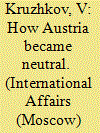

|
|
|
|
|
| Publication |
2008.
|
| Summary/Abstract |
In the process of the postwar settlement in Austria in the 1940s-1950s, the Western powers that occupied it (together with the Soviet Union) sought to draw the country into their military-political orbit. Needless to say, the USSR, which made a decisive contribution to freeing Austria from German Nazism and re-establishing its statehood, did not want the country to side with unfriendly forces again. As for the Austrians, spooked by the prospect of the "Sovietization" of the Alpine republic, they regarded the Western Occupying Powers as a guarantee of their sovereignty. However, when they realized that Austria was just "a bargaining chip" in a big geopolitical game, Austrian diplomacy became an independent player in the triangle of interests: the West - Austria - the USSR. As a result of intensive domestic political debate and hard-going negotiations with the parties concerned, the Austrians made a choice in favor of permanent neutrality. In the current debate on the issue of NATO enlargement, Austrian experience may prove to be highly relevant.
|
|
|
|
|
|
|
|
|
|
|
|
|
|
|
|
| 9 |
ID:
090025
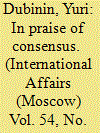

|
|
|
|
|
| Publication |
2008.
|
| Summary/Abstract |
What is consensus? This is one of the methods of making decisions at multilateral forums. In order to be approved by consensus, a decision should be supported by all, or at least not raise objections among any participants in the forum. This is its fundamental difference from the other methods, like the method of making decisions based on majority of votes.
|
|
|
|
|
|
|
|
|
|
|
|
|
|
|
|
| 10 |
ID:
090007
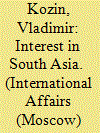

|
|
|
|
|
| Publication |
2008.
|
| Summary/Abstract |
An analysis of NATO, EU, and OSCE foreign policy objectives and other aims in the Central Asia Region* shows that, due to its special military and strategic position and vast raw hydrocarbon supplies, this region has been in the focus of the above organizations' attention for many years now. The interest of these international structures in the region is aroused by the fact that over the past 15 years this extensive area of Asia has become a vital link in the system of international military-political and economic trade relations. It borders on two regional zones of lingering instability - Afghanistan and Iraq. The West also sees Central Asia as a lever for controlling the situation in the neighboring Middle East, where Iran is located, as well as in nearby South Asia, where two next-door nuclear powers - India and Pakistan - have still not fully normalized their relations and are continuing to build up their nuclear missile arsenal.
|
|
|
|
|
|
|
|
|
|
|
|
|
|
|
|
| 11 |
ID:
090015


|
|
|
|
|
| Publication |
2008.
|
| Summary/Abstract |
THIS ARTICLE is inspired by the current impasse over Georgia and South Ossetia, but it does explore broader issues. Georgia is merely the geographical location where the wider tension between major international actors is being played out. It might appear that I am denying Georgia its own agency in this crisis. This is an unintended consequence of my approach. I think it is quite plain that Georgia either fell into a trap devised by Moscow, or acted with gross stupidity to precipitate a Russian response.
|
|
|
|
|
|
|
|
|
|
|
|
|
|
|
|
| 12 |
ID:
090005


|
|
|
|
|
| Publication |
2008.
|
| Summary/Abstract |
The most dangerous issue in US-Russian relations remains the conflict over Georgia and potentially Ukraine, which by extension encompasses disputes over the role of NATO, arms control, democracy promotion, Kosovo, and a host of other ancillary problems. Similarly, Russian concerns about US plans to install anti-missile interceptors in the Czech Republic, Poland, and possibly Turkey turn on competing views of the Iranian threat as well as broader disputes over Eastern Europe's role in the post-Cold War balance. Energy is another issue causing headaches in both Moscow and Washington. In short, Medvedev/Putin and Obama/McCain will have more than enough to worry about - if they can devote sustained attention to fixing problems in the US-Russian relationship.
|
|
|
|
|
|
|
|
|
|
|
|
|
|
|
|
| 13 |
ID:
090004


|
|
|
|
|
| Publication |
2008.
|
| Summary/Abstract |
Relationship between France and NATO was very aptly captured by Hubert Viidrine, France's foreign minister in the government of Prime Minister Lionel Jospin (1997-2002) in the slogan: "Friends, allies, not aligned." 4 This formula helped France regulate its relations with the USA and enabled France to establish in its foreign policy post-De Gaulle consensus which boiled down to the fact that France enjoyed the right to pass independent judgments in world policy matters, without making the break with the Atlantic solidarity principle.
|
|
|
|
|
|
|
|
|
|
|
|
|
|
|
|
| 14 |
ID:
090009


|
|
|
|
|
| Publication |
2008.
|
| Summary/Abstract |
The UN economic and social commissions for Asia and the Pacific (UNESCAP, or ESCAP) is an inclusive international organization established to encourage socioeconomic development of countries in Asia and the Pacific, sub-regional, regional and interregional cooperation. In population terms and the geographic span, it is the UN's biggest regional commission (ESCAP's population is 3.8 billion, or nearly 60 percent of the planet's population). Over 60 years of its existence, the Commission has proven its significance. In the meantime, the share of GDP of countries in Asia and the Pacific region (Pacific Rim) in the world has grown from one fifth to 28 percent; the share of export, from 15 percent to one third; the structure of export has changed - raw materials are being increasingly replaced with industrially manufactured goods. The growth rate of Pacific Rim countries has been for the ninth straight year higher than in other regions of the world reaching on average 8 percent. Life expectancy has increased from 41 years to 68 and the education level reached 80 percent.
|
|
|
|
|
|
|
|
|
|
|
|
|
|
|
|
| 15 |
ID:
090023


|
|
|
|
|
| Publication |
2008.
|
| Summary/Abstract |
A wide range of problems were discussed during the meeting. Thus, the two countries' leaders agreed to look for new ways of cooperation in the energy sphere, in particular, Russian gas deliveries to the Korean Peninsula. The heads of state also discussed joint development of the Western Kamchatka shelf and participation of South Korean businessmen in developing Siberia and Russia's Far East. Dmitry Medvedev and Lee Myung-bak agreed to expand cooperation in space, including within the framework of the Korean space launch program, and also considered prospects for bilateral cooperation related to the establishment of an international uranium enrichment center in Russia.
|
|
|
|
|
|
|
|
|
|
|
|
|
|
|
|
| 16 |
ID:
090003


|
|
|
|
|
| Publication |
2008.
|
| Summary/Abstract |
Understandably, the formation of national statehood is closely linked with the development of national identity, which presupposes overcoming the Soviet and pre-Soviet ideological stereotypes, analysis and, if necessary, review of the common past with regard to the changing historical conditions. Something else is disturbing: The natural process of the self-identification of newly independent states often proceeds according to designs borrowed from the Cold War era, with the attempts to cast Russia as an inherently aggressive and expansionist power, which forcibly annexed the adjoining territories and trampled on the rights, culture and traditions of its ethnic minority provinces. As a result, one set of stereotypes is being replaced by another, while their authors become hostage to their own illusions.
|
|
|
|
|
|
|
|
|
|
|
|
|
|
|
|
|
|
|
|
|